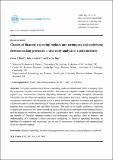Choices of financial reporting regimes and techniques and underlying decision-making processes : a case study analysis of a port authority
Abstract
This paper examines how financial reporting modes are determined within a company, from the perspective of perceived costs and benefits. The modes investigated include financial reporting regimes (e.g. International Financial Reporting Standards, UK Generally Accepted Accounting Principles) and the financial reporting techniques which support them (e.g. valuing intangibles and investments, treatment of development costs). A stated preference approach is adopted and applied to a fieldwork analysis of the functioning of a large port authority, which was a member of a group and prepared both consolidated and subsidiary accounts. The analysis is largely qualitative, exploring in-depth such matters as key factors in making choices, the decision-making processes behind choices, and the staging of decisions, but underpinned by a quantitative basis, using a metric for determining net benefits of financial reporting regimes and techniques. Our analysis aims to improve our understanding of a company's choice processes underlying its financial reporting, including its handling of complexity and uncertainty, and its use of innovations in techniques and organisational forms for decision support.
Citation
Reid , G C , Smith , J A & Hsu , Y-L 2021 , ' Choices of financial reporting regimes and techniques and underlying decision-making processes : a case study analysis of a port authority ' , National Accounting Review , vol. 3 , no. 2 , pp. 137-151 . https://doi.org/10.3934/NAR.2021007
Publication
National Accounting Review
Status
Peer reviewed
ISSN
2689-3010Type
Journal article
Description
This work was funded by the Carnegie Trust for the Universities of Scotland, whose support is gratefully acknowledged here.Collections
Items in the St Andrews Research Repository are protected by copyright, with all rights reserved, unless otherwise indicated.

